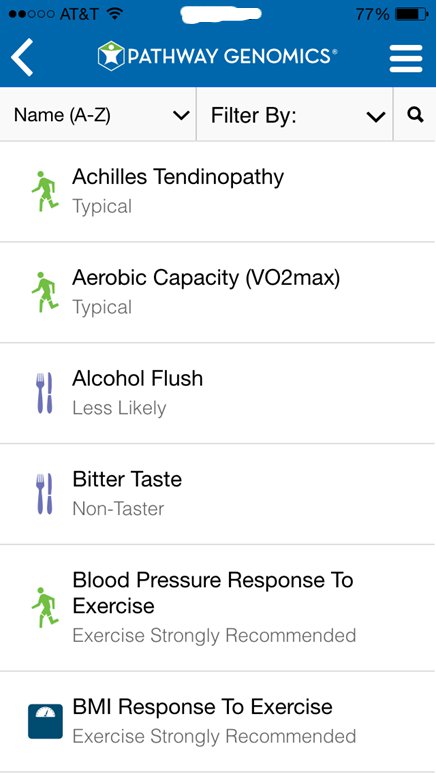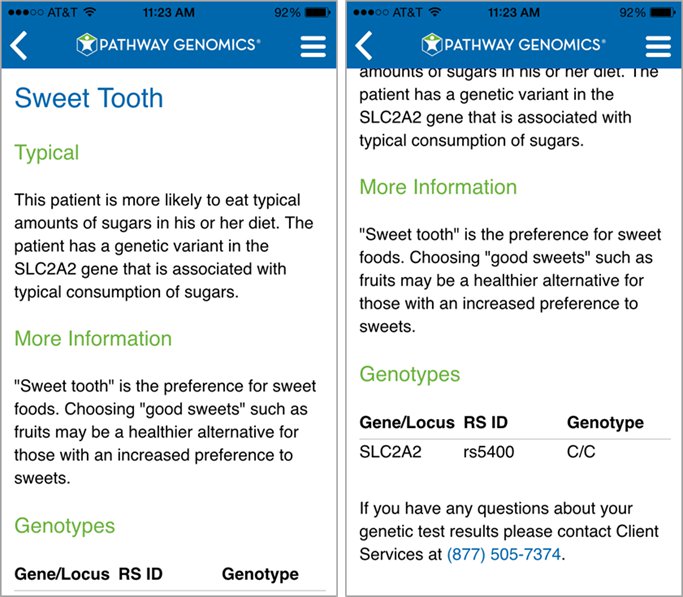The company recently offered me the chance to take their newest version of Pathway Fit, one that can be done exclusively from my smartphone. It is so easy that unlike the more complete web version of the test, I don't even have to get my doctor involved. A Pathway Genomics doctor looks over my application and checks my results before they get them back to me.
This app analyzes about 70 genetic markers that have been shown in at least one study to impact metabolism, diet and response to exercise. As you can see from the first page of my results, they have created a wonderfully simple app with an easy to understand interface.

Basically the 40 or so traits, the company test for, range in alphabetical order from “Achilles tendinopathy” through “Weight-Loss Regain.” On this first page there are simple recommendations/predictions based on my DNA. You can then click on a trait to get more detailed information and recommendations.
The idea is that I can then use these findings to tweak my diet and get the most out of any exercise I do. So from this first page I want to exercise for my blood pressure, and not worry too much about Achilles tendinopathy, alcohol, or bitter foods, and so on.
Enjoy that Martini and Keep Ignoring Sweets?
The test certainly did get some things right about me. For example, it predicts that I won’t have a bad reaction to alcohol and that I am a non-taster for certain bitter foods. These are both true.
But there are others they for sure got wrong. For example, both 23andMe and this test predict I am lactose intolerant which I am not. There are possible explanations but the test is wrong on this one.
And then there is this one:

(This is what the information looks like when you tap a specific trait. The images are side by side because since this is a phone app, I am using screen shots.)
I have a voracious sweet tooth and the test predicts that mine is just typical. It is not.
As is true for lots of traits like this, one or two genes aren’t enough to explain it. Yes many people with this result have a typical sweet tooth but I am not one of them.
I might have something in my genes somewhere (or a bunch of somethings) that overrides this single DNA difference and makes me crave sugar more than most. Or maybe my childhood gorging on Twinkies and Ding Dongs pushed me towards a sweet tooth. Or maybe a combination of the two.
For some of their other predictions I have no idea how to tell if the test is right or not. For example, it predicts I will have trouble resisting food (“increased food desire”). It may be that I do but how would I know?
Ease Gained, Information Lost
And that comes to a troublesome aspect of the smartphone app version of this test. The stripped down, mobile version lacks the supporting information of the web version that would help a consumer tell how reliable each prediction really is.
This was done to make this version about $300 cheaper than the web version. But the cost of lost information may not be worth it.
It is also important to mention that even with this information, it can still be hard to tell how reliable a prediction really is. Especially if you don’t have a strong scientific background.
This last point is not a problem just of the Pathway Fit test. It plagues most any direct to consumer (DTC) genetic test that tries to look at lots of complicated traits.
Which all points to one of the big difficulties of genetic tests like this one. Many of the traits we are most interested in are the ones we least understand.
So the smartphone version of Pathway Fit definitely suffers from a lack of supporting information which makes it less useful than the web version. But the web version is probably as good as any of the the other consumer tests out there. (Click here for a detailed review of the web version by genetic counselor Kayla Sheets.)
Keep in mind though that no matter the test you take, predictions and/or advice should be taken with a grain of salt until scientists better understand our genetics. Or perhaps a grain of sugar.



